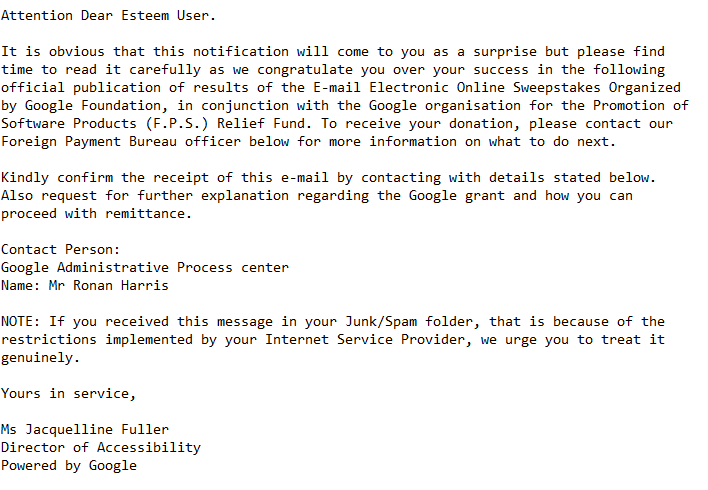Remove “Google Foundation – E-mail Electronic Online Sweepstakes” scam email
The “Google Foundation – E-mail Electronic Online Sweepstakes” email falls into the scam email category. The email claims that the recipient has been randomly selected as a winner of Google Foundation’s online lottery. The recipient can supposedly receive a donation, and all they need to do is contact the person mentioned in the email. The email can be classified as a scam, and its operators are aiming to steal users’ personal information as well as money.
This “Google Foundation – E-mail Electronic Online Sweepstakes” email is supposedly sent by Google. It explains that the recipient has been selected as a winner in something called Electronic Online Sweepstakes Organized by Google Foundation, in conjunction with the Google organization for the Promotion of Software Products (F.P.S.) Relief Fund. The recipient is asked to contact someone named Ronan Harris in Google’s Foreign Payment Bureau to receive their donation. The person would provide instructions on what recipients need to do next to receive the donations. Interestingly, the email provides an explanation for why the email would end up in the Spam/Junk folder, and it’s supposedly because of restrictions implemented by the recipient’s Internet Service Provider. If recipients have a Gmail email account, the idea that an email from Google would fall into the spam folder is entirely ridiculous. The email is very obviously a scam and users should not engage.
The full “Google Foundation – E-mail Electronic Online Sweepstakes” email is below:
Subject: Attention Dear Esteem User.
Attention Dear Esteem User.
It is obvious that this notification will come to you as a surprise but please find time to read it carefully as we congratulate you over your success in the following official publication of results of the E-mail Electronic Online Sweepstakes Organized by Google Foundation, in conjunction with the Google organisation for the Promotion of Software Products (F.P.S.) Relief Fund. To receive your donation, please contact our Foreign Payment Bureau officer below for more information on what to do next.
Kindly confirm the receipt of this e-mail by contacting with details stated below. Also request for further explanation regarding the Google grant and how you can proceed with remittance.
Contact Person:
Google Administrative Process center
Name: Mr Ronan HarrisNOTE: If you received this message in your Junk/Spam folder, that is because of the restrictions implemented by your Internet Service Provider, we urge you to treat it genuinely.
Yours in service,
Ms Jacquelline Fuller
Director of Accessibility
Powered by Google
If recipients respond to the email and reach out to the individual mentioned, they will be asked to provide personal information such as their full name, home address, and phone number. As the communication continues, the scammer may request even more personal details. Scammers often try to build trust with the recipient, making it easier to deceive them later on. After several exchanges, and once they feel a sense of trust has been established, scammers will typically ask for money. The reasons given for the request will likely be vague or somewhat illogical, but victims may not question it because they trust the scammer.
When scammers successfully gather personal information, they may use it themselves or sell it on hacker forums. Personal details like full names, home addresses, and phone numbers are valuable to cybercriminals, as they can be used for more sophisticated scams. Victims become more susceptible to fraud if they are addressed by name or if the scam involves personal information. Additionally, if scammers obtain credit card details, they will use that information for unauthorized purchases.
Any email that promises large sums of money is always a scam. The general rule is that if something seems too good to be true, it usually is. The “Google Foundation – Email Electronic Online Sweepstakes” email in no way looks legitimate, and it would be concerning if users fall for it. However, scammers often target older individuals who may be less familiar with these types of scams and more likely to fall for them.
Why did you receive a scam email?
Many users who receive scam emails might wonder how their email addresses end up in the hands of cybercriminals. While some scammers target random individuals, in most cases, receiving a scam email means the email address has been leaked. Unfortunately, email addresses are often exposed by various services due to inadequate security measures.
To see if their email address has been compromised, users can check on haveibeenpwned. It’s also important to understand that, along with email addresses, other personal information may be leaked as well. Although there may not be much users can do if their information has already been exposed, they should stay vigilant when dealing with unsolicited emails, phone calls, etc.
Site Disclaimer
WiperSoft.com is not sponsored, affiliated, linked to or owned by malware developers or distributors that are referred to in this article. The article does NOT endorse or promote malicious programs. The intention behind it is to present useful information that will help users to detect and eliminate malware from their computer by using WiperSoft and/or the manual removal guide.
The article should only be used for educational purposes. If you follow the instructions provided in the article, you agree to be bound by this disclaimer. We do not guarantee that the article will aid you in completely removing the malware from your PC. Malicious programs are constantly developing, which is why it is not always easy or possible to clean the computer by using only the manual removal guide.

